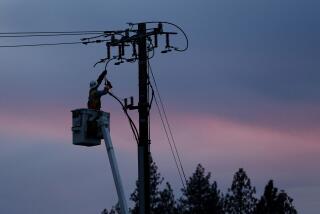PacBell Hikes Coin-Call Rate
- Share via
The price of a local call from a Pacific Bell pay phone in California will jump to 35 cents Monday, less than two weeks after new federal rules made the increase possible.
Pay phone callers also will be charged 35 cents for local directory assistance, a service that is now free, Pacific Bell said Friday. However, emergency 911 calls will remain free, as will 800 and 888 calls.
Consumer advocates said the increase will have an impact on all phone users, but particularly the poor, residents of urban areas, and anyone stuck at an airport or train station.
Pacific Bell, one of the first companies to raise pay phone rates under deregulation, noted that the cost of a pay phone call--now 20 cents--is increasing “for the first time since Ronald Reagan’s first term in the White House” in 1984. San Francisco-based Pacific Bell, which is owned by SBC Communications Inc., operates more than 141,000 of California’s 277,000 pay phones.
“The price for a local call from our pay phones has not changed in years, and the cost of providing quality pay phone services to our customers is increasing,” Tom Weber, Pacific Bell public communications director, said in a statement.
“Rate increases are never popular, but they are sometimes necessary,” Weber said. “We remain committed to providing the best overall value in pay phone service for our customers.”
Although the price goes up Monday, most Pacific Bell pay phone users won’t immediately begin paying more because the company must convert pay phone signs and mechanisms to the new price. Implementation of the directory assistance charge will require new software and modifications to area telecommunications switches.
Much of the work will be done within a month, and the tasks will be finished by the end of the year, said Stevan Allen, a spokesman for Pacific Bell.
The new pricing comes courtesy of the Telecommunications Act of 1996, which allows companies to charge market prices. The new rules went into effect Oct. 7.
Operators of pay phones have complained that their business is being eaten by cellular phones, prepaid calling cards and toll-free numbers. But opponents of price increases contend that telecommunications companies are making profits from their coin phones.
Consumer advocate Michael Shames said a price increase was expected, but “I’m particularly surprised at how quickly they responded.”
“This is not a sign of a competitive marketplace,” said Shames, executive director of Utility Consumer Action Network in San Diego. “This is akin to Gabriel blowing his horn and putting everyone on notice that all rates will be going up. The stampede now will begin.”
Regina Costa, telecommunications research director of the Utility Reform Network in San Francisco, said the price increase hurts all consumers because most locations offer phones of only one company.
“You have no choice,” Costa said. “You pay whatever it costs.”
But Pacific Bell’s Allen said the price increase “will benefit consumers because it will make sure that pay phones are widely available in the future.”
“The prices [before deregulation] were not enough for the companies to recoup their costs so that they can continue to provide pay phone service,” he said.
In the 13 years since its last pay phone price increase, Pacific Bell said in its statement, the consumer price index has jumped 57% and the price of a first-class postage stamp has risen 60%.
More to Read
Inside the business of entertainment
The Wide Shot brings you news, analysis and insights on everything from streaming wars to production — and what it all means for the future.
You may occasionally receive promotional content from the Los Angeles Times.










